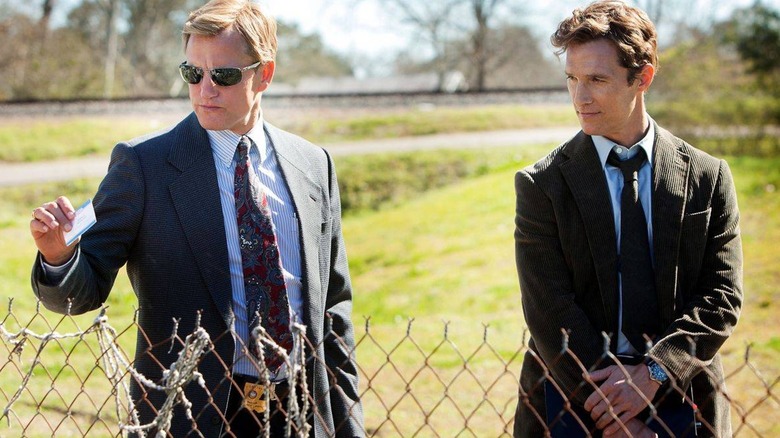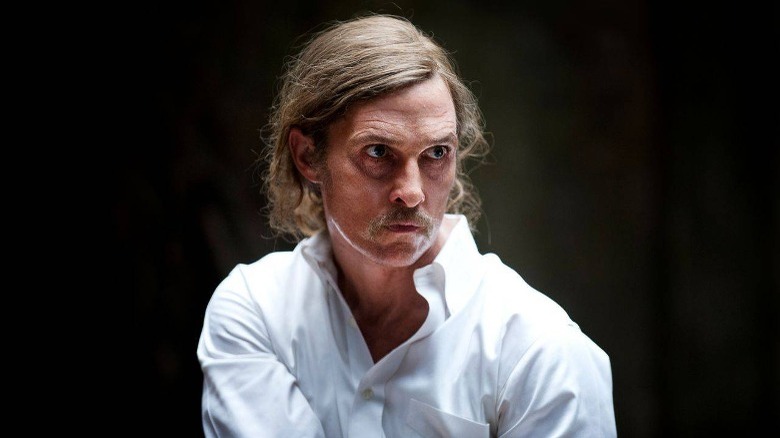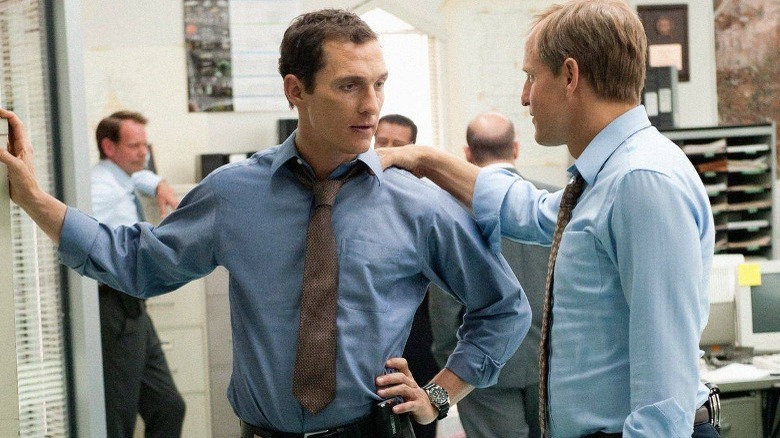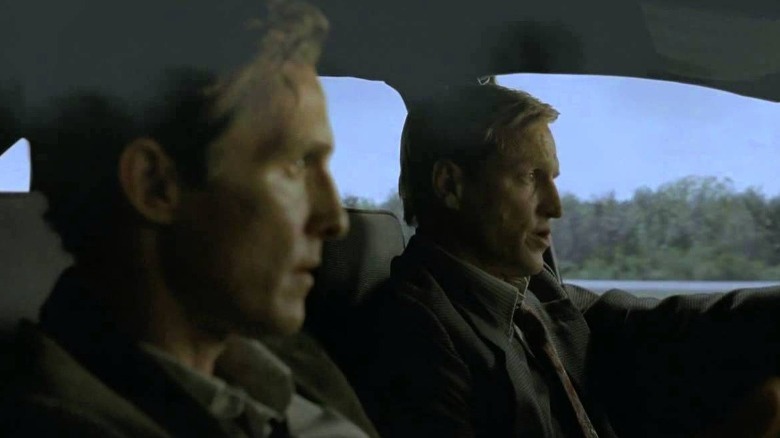True Detective's Director Wanted Matthew McConaughey For Woody Harrelson's Part
When thinking of the landmark first season of HBO's crime anthology series "True Detective," it's hard not to think of one major image: Rustin "Rust" Cohle (Matthew McConaughey) and Marty Hart (Woody Harrelson) in the front seat of a car, speaking of life and death in the language of jaded detectives. Marty's the funny one, but Rust is his wildly depressed and deeply nihilistic counterpart. Their inimitable chemistry is of the "opposites attract" variety, like the HBO drama version of "Lethal Weapon."
The two actors had been paired up before, but never to this effect, and never with this much shared psychological weight. It went way beyond what you could find in films like the execrable "Surfer, Dude" or the "Truman Show" also-ran "EDtv." The benefits of a longer story gave each actor the chance to really dig beneath the superficial appearance of their characters, whether it was McConaughey's demonstration of the warmth and empathy in Cohle or the darkness and womanizing that was in Hart.
There is nothing like a false note in their work, even across multiple timeframes and in various compromising circumstances. Catching the killer or solving the case wasn't the point of the show, which was more concerned with studying human nature.
Because of that, the idea that this was an odd role for McConaughey to take at the time doesn't even register now. But it definitely clashed with the rom-com image the actor had cultivated through the 2000s, which had much more in common with the casual comedy of Marty than Rust's deep-seated nihilism. In fact, McConaughey was offered the part of Marty. He had to make a plea for the chance to play Rust.
New kinds of roles
In 2014, when the first season of "True Detective" aired, Matthew McConaughey had just begun to shed the weight that a decade of romantic comedies had put on his image.
As American cinema's foremost handsome slacker, he reoriented the genre with movies like 2006's "Ready to Launch" (as a manchild) or 2003's "How To Lose A Guy In 10 Days," (as an ad executive), and in turn, they redefined him. For all of his promising work in the first decade of his career, beginning with the 1994 teen movie classic "Dazed and Confused," he had ended up a simple repository of laidback Southern charm and the face of a genre that was dying. That was just about to change for him.
While the effortless humor McConaughey showed off in romantic comedies would have made him a great fit for "True Detective" character Marty Hart, one can see in his role choices around the time an interest in something darker, or at least more serious. Something more like Rustin Cohle.
The Southern gothic folk tale vibes of Jeff Nichols' 2012 film "Mud" allowed McConaughey the chance to be a tragically romantic hero, and his showings in both the original "Magic Mike" and "Wolf of Wall Street" saw devilish energy behind every wickedly funny line delivery. No performance in particular marked this new era for the actor. It was a feeling generated by a number of well-timed choices that reminded viewers of his capabilities, something that had in internet circles gained the name of "the McConaissance."
Shortly after his run on "True Detective," in fact, he won the Academy Award for Best Actor for his role in "Dallas Buyers Club."
The appeal of Rust Cohle
The McConaissance was crystalized by Matthew McConaughey's work on "True Detective," the darkness and existential aching of his performance as Rustin Cohle. It's the kind of work that generates immediate praise and career reappraisals. Knowing that many of the character's distinctive mannerisms and complex physicality came from the actor helps too.
McConaughey could have been equally great (in significantly different ways) as Marty Hart, but fighting for the chance to play Cohle was the right move. With McConaughey having recently lost weight from his work in "Dallas Buyers Club," his Cohle was able to look skeletal, really reflecting the character's proximity to the abyss.
"Yeah, sure, hire him on, he's a good old American dude," was what the show's director Cary Fukunaga recalled thinking to Salon when he had learned McConaughey was reading for the part of Hart. It might not have occurred to him to cast McConaughey in the darker role, but the actor had become enamored with the part. He had what Fukunaga called "a really compelling argument for why he wanted to play Cohle."
As McConaughey told Studio 360, when reading the mammoth, novelistic script for the show's first season, he was aware that he was being considered for the part of Hart. But it was Rust Cohle's soulful monologues about the nature of the universe that really appealed to him. Cohle was the guy McConaughey couldn't "wait to hear what comes out of his mouth every time I turn the page."
A little bit of Hart and Cohle
A not-insignificant part of the lore that comes from Matthew McConaughey's iconic performance as Rust Cohle in "True Detective" is from his off-beat but extremely effective actorly process. Besides developing the character's unique body language, he also dug deep into what makes Cohle tick, going so far as to write a 450-page guide to the character. That guide summarized "the four stages of Rust Cohle," some of which viewers see, some of which is left to interpretation. With McConaughey's thorough work, there's no muddled quality to the character's dark and twisty backstory.
The second McConaughey made his pitch to director Cary Fukunaga and writer Nic Pizzolatto, they were convinced. In particular, Pizzolatto, who had seen William Friedkin's masterful 2011 film "Killer Joe," (which cast the actor as a detective-hitman) knew that McConaughey was "one of the few actors who could say Rust's dialogue and make you believe it," according to the Guardian.
But McConaughey's second-most significant contribution to the casting of "True Detective," besides vying for the part of Cohle, was knowing who could best take on the role of his partner. Having lost their first choice for Hart, the show's creative team was seeking out who could be next. As Fukunaga told Salon, McConaughey "was the one who came up with the idea of Woody Harrelson." Because of the two's easy chemistry from way back and McConaughey's bone-deep knowledge of Cohle, the characters' interactions feel real and honest. While the tangled mysteries of "True Detective"'s first season are as compelling as ever, the Hart and Cohle dynamic is why it stands tall.



